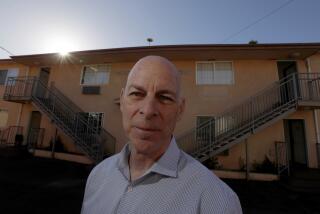Files Show Pierce Took Role in HUD Funding : Letter From Watt Thanks Former Secretary for Backing Baltimore Project That Got $28 Million
- Share via
WASHINGTON — Newly released records from the files of former Housing and Urban Development Secretary Samuel R. Pierce Jr. provide additional evidence that he became involved in selected cases at the behest of political associates, contrary to his statement before Congress that he played little role in awarding HUD funds.
In one case, former Interior Secretary James G. Watt wrote to thank Pierce for his support of a suburban Baltimore housing project that was awarded $28 million in Section 8 moderate rehabilitation funds in May, 1986. Watt had been hired by the developer of the project to help obtain the HUD money and, according to previous testimony, had met with Pierce to discuss the project.
“Thanks!” Watt wrote Pierce on June 6, 1986, after the funds were awarded. “You are a man of your word.”
Referring to Silvio DeBartolomeis, then general deputy assistant secretary for housing, Watt said: “Silvio has carried out the necessary paper work to give the county of Baltimore 312 units of Section 8 Mod-Rehab units. This is as we discussed and will make an excellent project for all concerned.”
Invitation to Visit
In the same letter, Watt also invited Pierce and his wife, Barbara, to visit him at his new home in Wyoming. Neither Watt nor Pierce could be reached for comment Thursday.
In testimony before a congressional subcommittee in May, Pierce said he did not do special favors for consultants or developers and had merely instructed subordinates to give personal requests “careful consideration.”
In his May 25 testimony, according to a committee transcript of the hearing, Pierce said he did not remember much of his meeting with Watt.
“All I can say is Jim Watt, he called me, came in to see me, and talked about housing,” Pierce said. “I don’t even remember the details, but I told him . . . that we would look at his project very carefully and I then turned him over to the staff in housing who handled the particular matter. That’s all . . . . No promises were made to him.”
HUD records and subsequent testimony before the House subcommittee investigating HUD have since shown, however, that Pierce and his executive assistant Deborah Gore Dean intervened on behalf of prominent Republicans and former HUD officials who appealed to the agency for aid on housing projects.
Watt split a $300,000 consulting fee on the Maryland project--Kingsley Park--with Joseph Strauss, a former special assistant to Pierce who formed his own consulting firm after leaving HUD and has since earned $1.7 million in HUD-related contracts.
Watt has testified that he contacted Pierce on behalf of Kingsley Park and other projects to get the “career bureaucracy” to move on the applications that awaited HUD action.
Stuart E. Weisberg, staff director and counsel for the subcommittee, said the letter “clearly suggests there was more involved” in the meeting between Pierce and Watt than either acknowledged in their testimony.
The Pierce documents--obtained under the Freedom of Information Act--also show that other public officials and developers used access to the secretary’s office to get guidance and support for troubled projects.
In the Watt case, Rhode Island developer Judith Siegel approached HUD officials from the HUD field office in Baltimore in 1986, mentioning Watt’s name and telling them that she was confident she could obtain moderate rehabilitation funds for more than 300 low-income rental units in Baltimore County.
More to Read
Sign up for Essential California
The most important California stories and recommendations in your inbox every morning.
You may occasionally receive promotional content from the Los Angeles Times.










